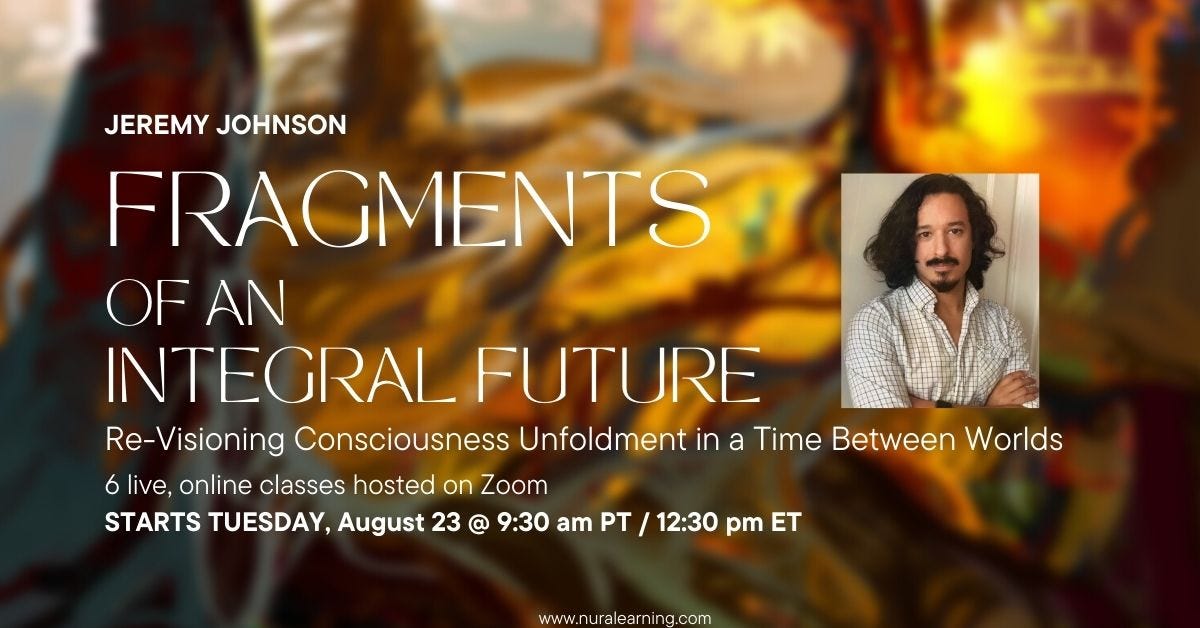New Course in August: Fragments of an Integral Future
August 23 - September 27.
Dear readers,
I am honored, and even thrilled, to announce a forthcoming online course, “Fragments of an Integral Future: Re-Visioning Consciousness Unfoldment in a Time Between Worlds.”
It runs from 23 August - 27 September.
This course is the first time I will be “teaching the book,” as it were. Fragments of an Integral Future (2023) is still in its draft form, but offering coursework on the materials, as I’ve found in the past, has provided invaluable feedback and even added a sense of “aliveness” in the completed text.
So, those of you joining the class will not only be the first to get a sense of what Fragments is covering, your participation is also helping to shape the book.
So what is the course about? You can get a taste of it through the lesson outline:
Lesson I: Time and the Rhizome
Lesson II: Re-Visions: Myths and Narratives in the History of Consciousness
Lesson III: Being & Becoming Planetary (Or, New Ways to Talk about Development)
Lesson IV: Temporal Toolkits and Medicine Bundles for a Time Between Worlds
Lesson V: The Future is Open: Post-Capitalist Desire and Time-Freedom
Lesson VI: Infinite Planetary Manifestos
The first three lessons (and Fragments itself) take their inspiration from other classic texts in the field: Ken Wilber’s Up From Eden and The Atman Project, William Irwin Thompson’s Coming into Being: Artifacts and Texts in the Evolution of Consciousness. In the spirit of James Hillman’s Re-Visioning Psychology, I argue that we need a re-visioning of the history of consciousness.
What happens when we knock down modernist cultural narratives concerning progress, which nearly always accompany stage-centric models of human development? What other approaches to thinking about development—unfoldment, emergence, becoming—and human consciousness transformation can then be foregrounded? What other narratives, what other stories and voices, become possible?
The first three lessons attempt to address this argument, unpack it, and then re-tell, or re-vision the history of consciousness according to different principles. I will be drawing from the works of integral thinkers like Jean Gebser, but also works of indigenous scholarship, archeology, and anthropology to present a different (read: far less linear) and more complex story of human consciousness unfoldment.
This emergent story leads to a very different conclusion: it renews our relationship with history, as well as the future.
The emergent story challenges us to work towards the realization of a new consciousness of time (along the lines that Jean Gebser suggested in The Ever-Present Origin). I suggest that this new consciousness of time is increasingly necessary for navigating our present time between worlds. We negotiate a zone of liminal, if generative tension: between one worldview unraveling and another one cohering.
What we learn here, in this zone of becoming, is critical.
The rest of the course - and the book - flips from the project of re-visioning of the history of consciousness to what we might call a “brief history of the future.” We look more to recent history, from the advent of the steam engine and the industrial revolution to the present conditions of our warming planet. What this more recent history suggests is an emerging “mutation” (i.e., transformation) of human consciousness towards a new relationship with time, an “integral” relationship. New modes of thinking, new maps and new conceptual tools, new (and ancient) practices are needed to engage fully with the unthinkable conditions of our present civilizational crisis.
The course will - I certainly hope - land on a note that suggests that the future is open, and planetary homecoming is possible. Therefore, may numberless planetary futures bloom.
I look forward to meeting some of you in class.
If you need a student rate for registration, or have any questions, please send me a note via email.
See you in August!
Sincerely,
Jeremy



